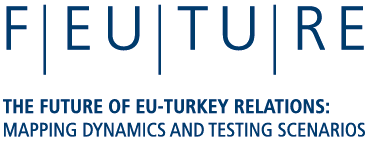The Future of EU-Turkey Relations: Mapping Dynamics and Testing Scenarios
The EU and Turkey face mounting challenges both in relation to one another and internationally. The EU has recently been confronted with a series of crises, e.g. in the economic and migration dimensions. These developments as well as the Brexit-question are likely to make differentiation a growing phenomenon. On the other hand, Turkey faces polarisation between different political forces, the state and civil society. The neighbourhood is unravelling to the east and south and a power shift is under way at global level. This questions the regional roles of Turkey and the EU.
Against this backdrop, FEUTURE’s research aims to:
- map the dynamics of EU-Turkey relations as to underlying narratives and thematic drivers;
- substantiate most likely future scenario(s) and assess its implications;
- draw policy recommendations.
FEUTURE provides excellence and pursues an ambitious, inspiring and innovative programme in a three-phased structure of elaboration, exploration and extrapolation. It applies an inter-temporal, interdisciplinary and international approach by analysing drivers within six thematic dimensions (politics, security, economics, energy, migration, identity) and across four levels of analysis (EU, Turkey, neighbourhood, global).
FEUTURE Research Approach
Phases 1 and 2 culminate in an extrapolation phase in which FEUTURE integrates new knowledge and tests the implications of 3 ideal-type future scenarios for EU-Turkey relations: conflict, cooperation and convergence.
We engage in a trans-disciplinary exchange within an elite survey and with the knowledge-user community from the four levels of analysis exploiting the full range of virtual and social media as well as traditional means. FEUTURE’s work plan guarantees coherence of its research approach by streamlining work in one conceptual, one synthesis, two organisational and six thematic work packages. Joint WP meetings and three FEUTURE conferences assure intensive horizontal exchange. FEUTURE will achieve academic, practical and structural impact beyond the project.
FEUTURE six thematic dimensions:
The political dimension is most closely related with the overall pace of EU-Turkey relations. Research will take into consideration that progress in Turkey’s political performance has often been related to and has justified progress in Turkey’s European integration and vice versa. At the same time, setbacks in Turkey’s democratization have been linked to stagnation in its European integration path.
The economics dimension will focus on the economic ties between Turkey and the EU and the way these are conditioned both by the economic performances of the two sides and by relations with the neighbourhood and global markets.
In the security dimension, Turkey’s membership of NATO (as the second largest armed force in the Alliance) critically shapes EU-Turkey relations (as well as EU-NATO relations). Likewise, Turkish ambitions to become an independent regional power affect security ties with the EU. At the same time, Turkey’s relations with the EU condition both the EU and Turkey’s relations with the neighbourhood as well as with key global actors such as Russia and the United States.
In light of Turkey’s growing importance for the EU’s quest for energy security through the diversification of energy sources and routes, the energy dimension will focus on whether Turkey will end up representing an energy hub, for Europe at the heart of the Southern Corridor and thus contribute to the EU’s energy security.
Concerning the migration dimension, the research will analyse the flows of skilled migrants between Turkey and the EU, the transit of irregular migrants from Turkey into the EU, and the evolution of Turkish and EU asylum policies, and the way these have affected the broader scope of the EU-Turkey relationship.
The identity dimension will focus on the diverse perception of identity of both Turkey and Europe by Turkish and EU actors.
FEUTURE three ideal-type scenarios:
(1) Conflict-Scenario: Growing estrangement
(2) Cooperation-Scenario: Engagement without accession
(3) Convergence-Scenario: Turkey’s EU membership e.g. with internal differentiation
Coordinators:
Project Coordinater: Prof. Dr. Wolfgang Wessels, Director of the Centre for Turkey and European Union Studies at the University of Cologne
Scientific Coordinator: Dr. Nathalie Tocci, Deputy Director of Istituto Affari Internazionali
FEUTURE project lifetime:
Project start: 1 April 2016
Project end: 31 March 2019

This project has received funding from the European Union’s Horizon 2020 Research and Innovation Programme under Grant Agreement No 692976.
